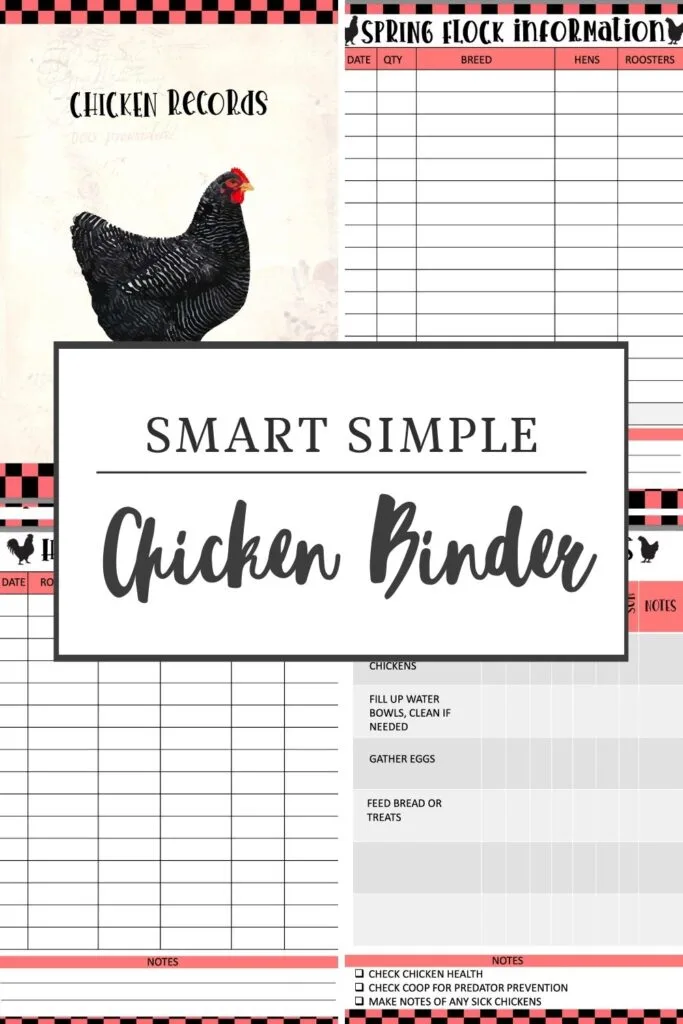I’m seeing it all over my social media feeds; the price of eggs is insane, so you’re thinking of raising chickens. I get it, it’s the perfect push to get started with your own chickens.
You want to be able to walk out to the backyard, collect some fresh eggs, and have fresh omelets every morning.
But I’m here to tell you that it’s not all sunshine and rainbows when raising chickens.
It takes work, dedication, and a whole lot of chicken feed. But if you’re up for the challenge, read on, my friend. I’m going to give you the low-down on how to raise chickens for maximum egg production.
Then, get ready for some real talk about what it takes to be a successful chicken farmer.
Let’s Get Into How Do You Raise Chickens for Beginners?

Build or buy a chicken coop that is big enough for your chickens to move around in
Nothing beats building a DIY chicken coop if you’re looking for a smart, frugal way to house your chickens. It doesn’t take much time, and it’s cheaper than buying one at the store.
With a little bit of woodworking know-how, some imagination, and some help from YouTube videos and blogs, you’ll have enough room in your custom-built chicken coop to let your chickens fly, run around and enjoy their home away from home in no time! ( Scroll down for the space needed per bird in your coop)

For More tips on How to Go About Building a Chicken coop check out below.
- How to Grow a Garden For Your Chickens
- Top 5 Chicken Breeds that Lay Large Eggs
- Why A-Frame Chicken Coops May Be the Best Option for You
- A Guide for Winterizing Your Chicken Coop
- The Magic of Dried Leaves in Your Chicken Run, Pig Pen, and Goat Run
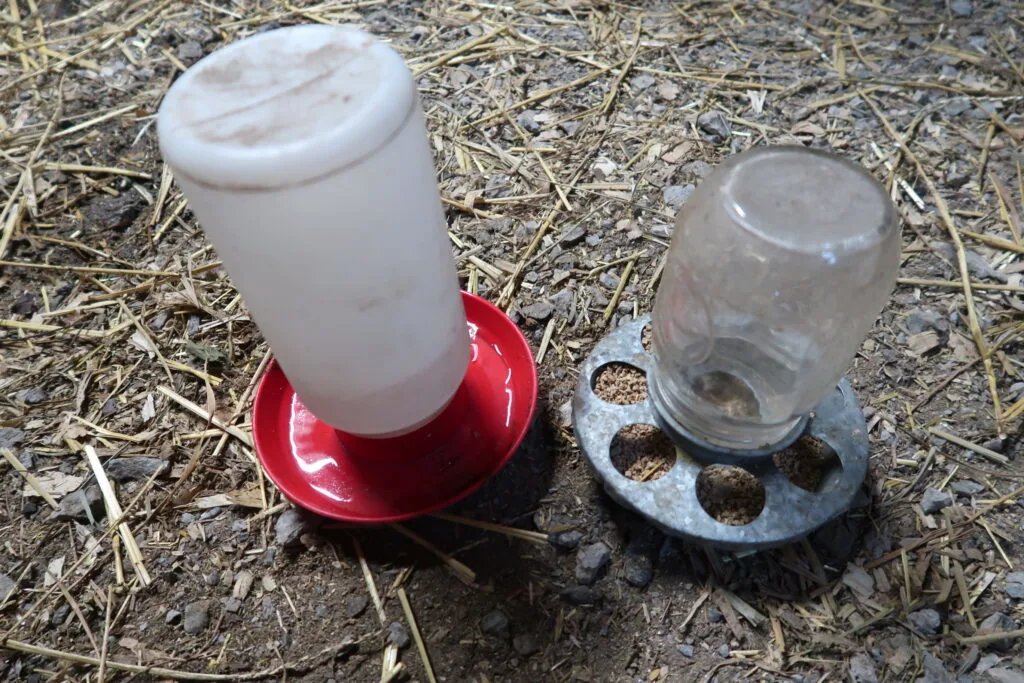
Get a feeder and waterer that are specifically designed for backyard chickens
If you’re planning on getting chickens, one thing you should absolutely invest in is a feeder and waterer that are specifically designed for poultry.
When you start with baby chicks, you must get a smaller waterer. Then, as the chickens grow, you can cheap out and use household items.
As a frugal farm girl raising chickens for almost ten years, it’s easier to use chicken feeders and waterers. The birds prefer it too. They will drink out of buckets but they don’t prefer it.
Here are the links to the feeders and waterers we use. Tap here for all the frugal items you can use around your home.
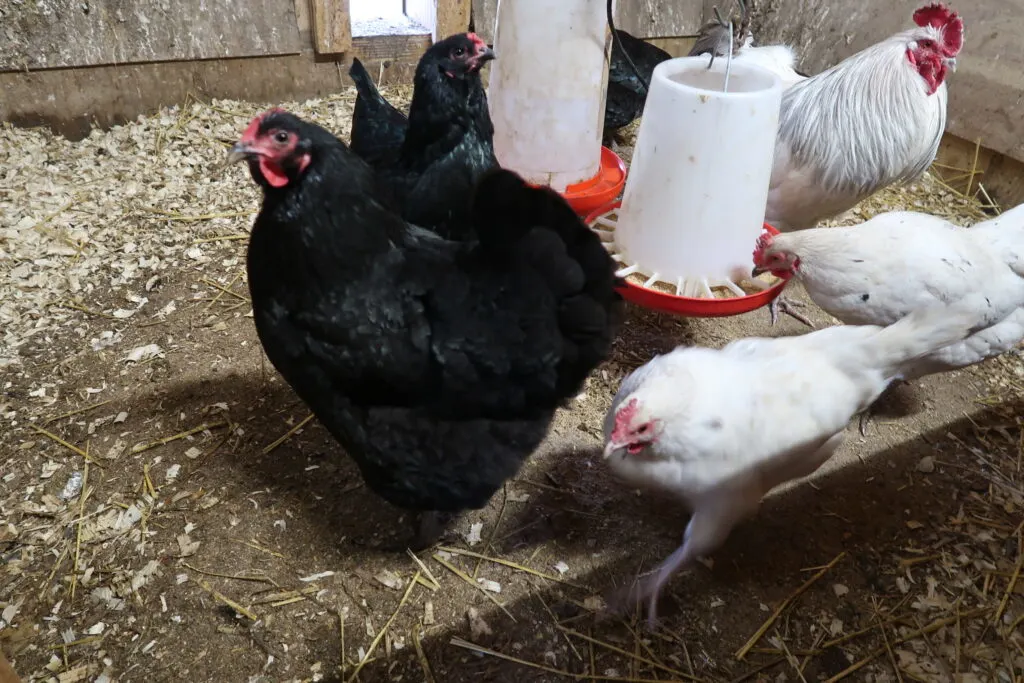
Best Feed for Chickens
Don’t believe the myth; you can’t overfeed chickens. Instead, the best feed for chickens is a diet high in protein and low in fat.
If you don’t provide proper nutrition it will decrease their egg production; so if you have been getting fewer eggs than usual, this might be why.
Bottom line – feeding your chickens with protein-rich foods builds stronger bones and eggshells, keeping them in the best condition.
When you shop around for the best price on chicken feed, pick a feed with at least 16% protein. The best price for our chicken feed is at our local farm store Runnings.
I will always watch for Tractor Supply and Country Max if they have a sale on chicken feed and grab it then.
To help me stay organized I use a chicken planner. Grab your copy here.
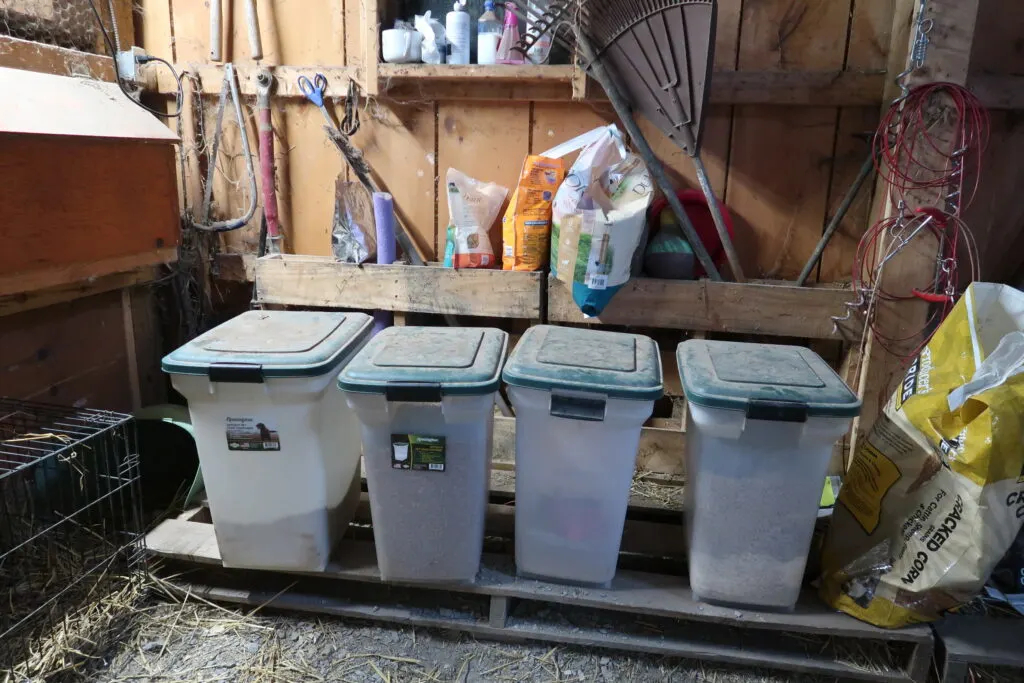
Keep your chicken feed stored off the ground or in a plastic storage bin. We use pallets in the barn, and I bought these plastic containers for the feed. Before I had the bins, the mice would be IN THE BAG! That gave me a nice freak-out moment.
Our barn cats have really helped keep the mice down.
To add to our chicken diet, I buy a bag of cracked corn from our local farm supply stores in the winter. Cracked Corn and dried mealworms are treats chickens get in the wintertime on our farm.
What is the Best Time to Feed Chickens?
The best time to feed chickens is right before sundown. Chickens, like other animals, have an internal clock and they’re used to having a regular schedule that provides consistency in their lives.
They need at least 14 hours of light during the day to produce eggs, so ensure you give them enough sunlight each day. In the winter, I’ll keep an extra light on for the girls right above our nesting boxes during the day.
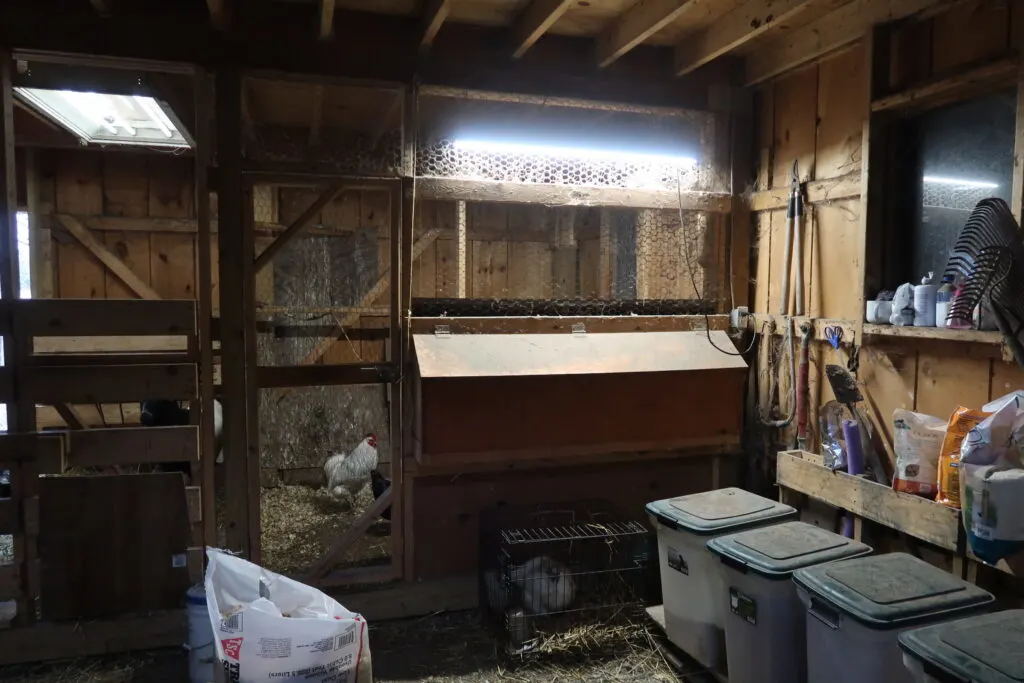
As far as how often to feed chickens? I keep their feeder in the coop- unless we have a rat problem, then I’ll put it away at night.
I give one or two morning scoops and then another at feeding time. It doesn’t matter when and how much you feed them as long as they have access to fresh food and water throughout the day.
You’ll notice in the winter you go through more feed and in the summer not as much.
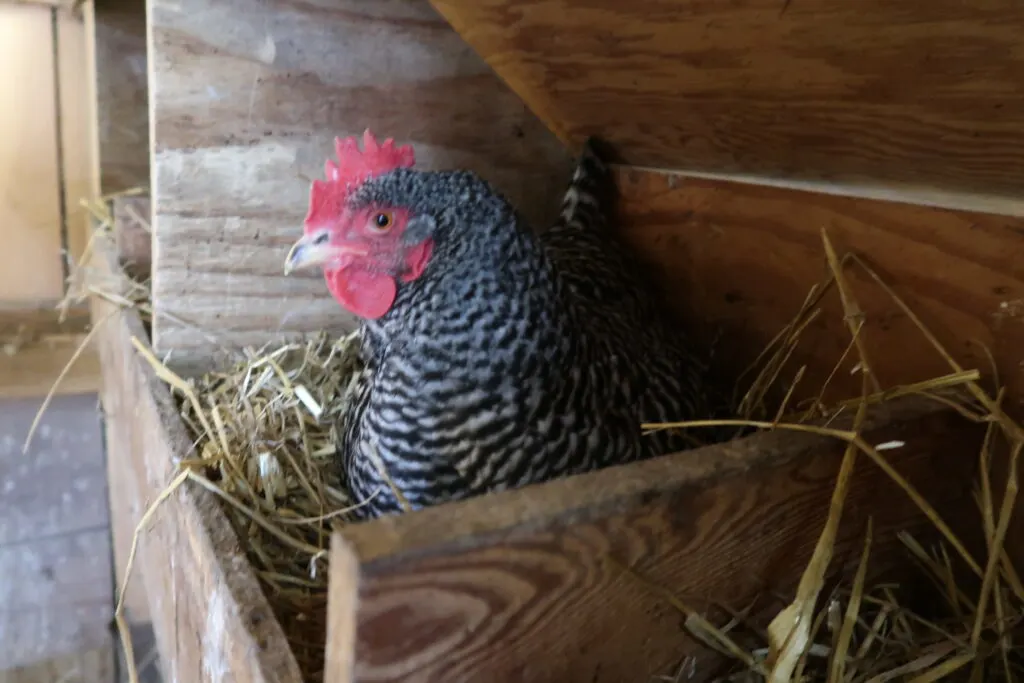
Choose Breeds That Produce More Eggs
Regarding egg production, some chicken breeds are better than others. Selecting a breed of chicken known for its egg-laying prowess can give you a considerable boost in production, giving your flock the best chance to produce as many eggs as possible.
Breeds like Rhode Island Red and Leghorn are some of the most prolific layers around, and they’re also quite hardy so they can withstand harsher conditions than some more delicate breeds.
Here in Western NY, my Rhode Island Reds have been excellent layers but have been the most prone to disease.
Since we started incubating our eggs, our flock has been much healthier. But, of course, so many things can factor into the health of your chickens. As a backyard farmer, you know that despite your best efforts to keep your livestock healthy, sometimes it just doesn’t work out.
We’ve succeeded with Black Australorps and Barred Rocks for being excellent egg layers. Sometimes our leghorns lay two eggs a day!

There is the fall molt that all breeds of chickens will go through. During this time, your healthy hens will stop laying eggs for a short period. You will see new feathers emerging on the birds. Once they have finished molting, the hens will begin laying eggs again.
The period typically is about 4-6 weeks, from what I’ve experienced. Since we have about thirteen hens, we still get eggs during this time, but it goes down to one- three eggs a day instead of thirteen.
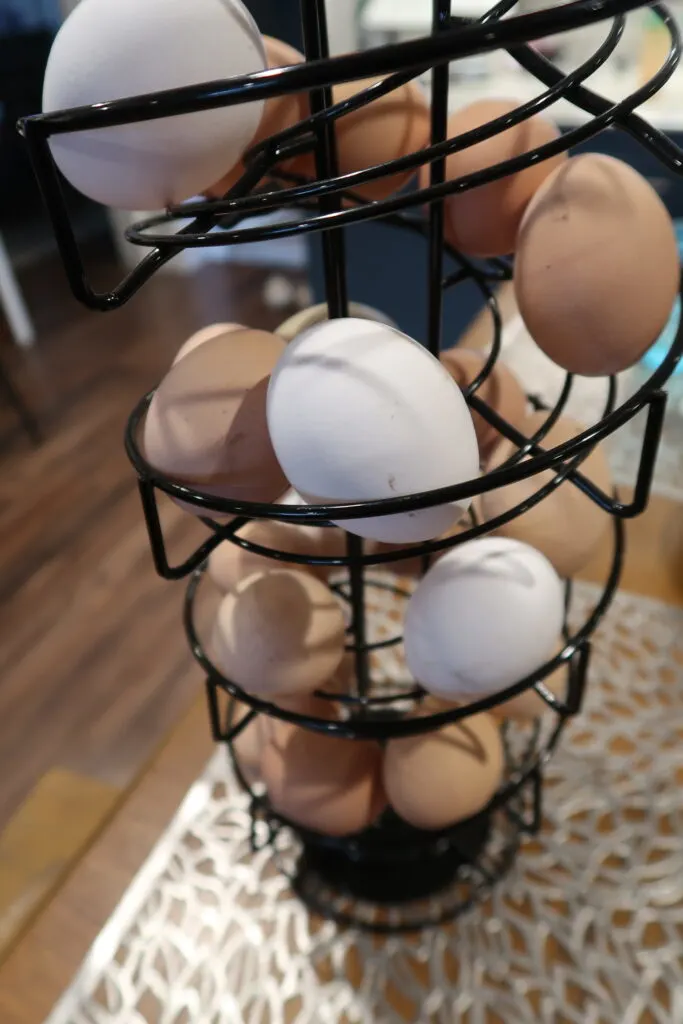
If you are looking for those pretty blue eggs, you will want to choose a breed like Easter Egger that lays colored eggs. I love having some green and blue farm fresh eggs into the mix. Leghorns lay white, and it’s fun to have those pops of white in with the brown eggs.
It’s all about the breeds available to you and what fits into your price range.
You can grab that egg holder I use on Amazon here.

How Many Baby Chicks Should You Start With?
You may have to abide by state laws depending on where you live. For example, in New York state, we have a six-bird minimum. So that means if you are thinking about caring for chickens in New York state and not buying from a farmer, you know, you need to buy at least six chickens.
When you go to purchase chicks, you will want to start with hens. That means when you are shopping at a local farm store, and they have a baby chick for sale, you will want to avoid the bins that say straight runs. Unfortunately, this means there are hens and roosters in there.
Sexed chicks will have a sign that says Pullets. This means they are all hens or should be. Trust us when we’ve bought pullets from Tractor Supply before and got a couple of roosters.
Starting with six chickens is plenty. Ideally, I would begin with four if we didn’t have that law. Next, think about how many eggs your family eats per week. Remember you get one egg per day, six eggs a day means you have 42 eggs a week.
Right now, we have thirteen eggs a day coming, which would be way too much, but we give them to the animals, eat quite a few, and then give some to our neighbors.
This is where the chicken math comes in. Chicken math is a real thing, and because chicks are so incredibly adorable, it’s hard not to get caught up in buying a bunch or buying more just a month or two into your chicken farming.
How many chickens you should start with depends on your family size, space, and budget.
Read this article for tips on raising chicks on a budget

Supplements to Increase Egg Production in Chickens
If you’re looking for a way to give your chickens an extra boost toward maximum egg production, supplements are the perfect way to do it. Supplements are available in many forms, such as powder, pellets, and liquid. These supplements can be added to your flock’s feed to give them the extra nutrients they need.
Joint supplements include oyster shells, calcium, probiotics, vitamins, and minerals which help build strong bones, lay more giant eggs with thicker shells, increase fertility, and boost general health.
You can cook eggshells and then pound them down for extra calcium. Then, whenever I notice older hens and the egg’s shells start getting thin, I cook up a batch of eggs.
Save the eggshells and roast them in the oven for about 15 minutes. Then I’ll take a rolling pin, crush them all down, and sprinkle them over the chicken’s food.
Yep, they love it. They’ll eat their eggs, too, if they crack open. I throw eggs to our pigs all the time, and if the chickens are roaming out in the pig pen, they run over and start pecking away at the egg.
It’s essential to keep track of supplements and how much you are giving. I use my chicken planner and keep it out in the barn to write everything down.
You do NOT want your hens to do this to their own eggs. If you start noticing a hen pecking at the eggs in the nesting box, you have a problem and it needs to be fixed right away.
You can remove the hen from the coop for a few days or immediately give her some cooked eggshells and supplements.
The frugal supplements I give to boost the health of my chickens are apple cider vinegar in the water ( a couple of teaspoons 1x week), Rooster Booster. Then I use Molly’s Herbs as a natural dewormer for all the animals on our farm.
Molly’s dewormer works excellent if you notice your chickens making what sounds like a bark- it helps the worm load.
To help you keep track of medications and flock numbers grab my adorable chicken planner!
When Does a Chicken Start Laying Eggs?
This is the worst part of owning chicks. It takes a very long time for the eggs to come. Especially when it’s your first time.
Typically, it will take around 4-6 months before a chicken starts to lay eggs. However, this timeframe can vary depending on the breed and size of the chicken. Smaller breeds tend to start laying sooner, while larger breeds take more time to reach maturity.
Providing your chickens with a balanced diet is essential as well. Feeding them high-quality feed will help ensure they get all the nutrients they need to produce eggs.
Anytime you introduce new chickens into your flock, make sure to quarantine them for at least two weeks before putting them in with the rest of your birds.
This can help prevent disease spread and allow new additions to become acclimated to their new environment. For a how-to on how to introduce your chicks to your flock tap here.
Grab my Daily Chicken Care Checklist here!
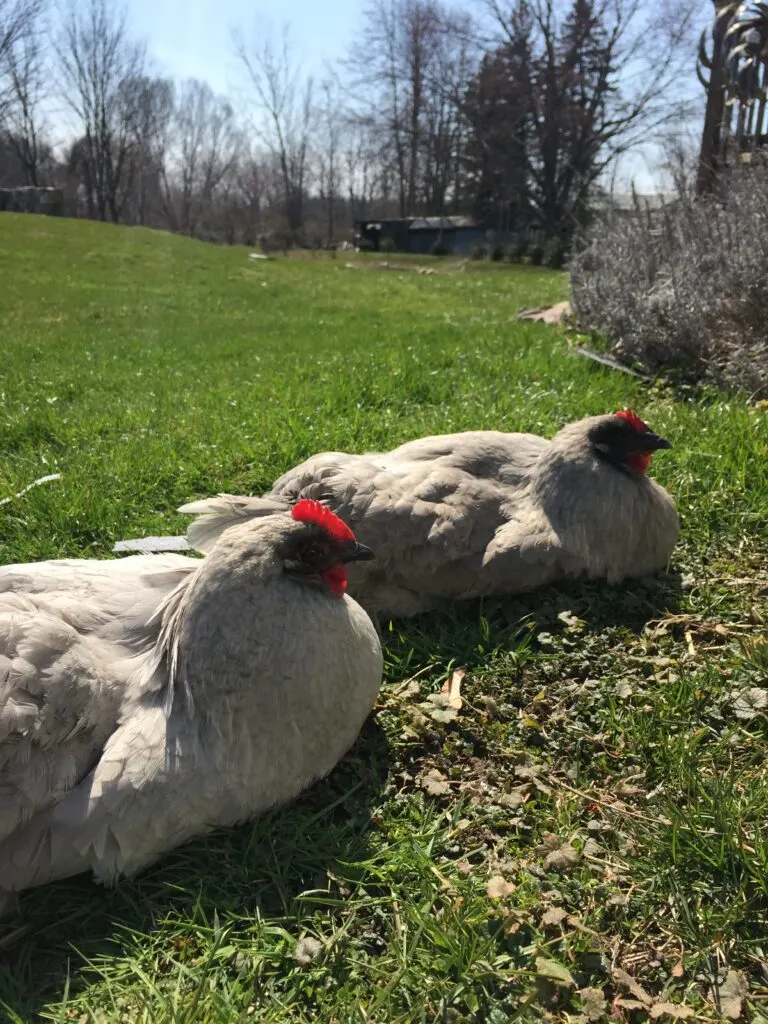
How Much Space Does a Chicken Need?
It’s crucial to provide your chickens with enough space to move around and spread their wings. Generally speaking, you should give each chicken at least four to six square feet of space in the coop and eight square feet in the run.
If you have laying hens, I find it best to have at least two nesting boxes for six hens because, no matter what, a couple of hens will need to lay simultaneously. Sometimes hens will have a box they prefer and join another hen in it. They are pretty entertaining.
You should also provide your chickens with plenty of dirt or sand areas to scratch in, as well as plenty of perches to rest their wings while they are awake. This helps to prevent boredom and ensure they stay healthy.
Ensure your chickens have plenty of fresh air and access to natural sunlight. Natural light helps regulate their sleep cycles and gives them Vitamin D, essential for egg production.

How Much Does it Cost to Raise Chickens?
If you are here because the price of eggs is crazy high and you think raising hens will be cheaper, the short answer is it won’t. It’s much cheaper to buy eggs from the store.
Backyard poultry is more about having a fun and rewarding hobby rather than saving money. The cost to raise chicks depends on many factors, such as breed, feed costs, and housing.
If you are starting, you will have initial start-up costs that will most likely be $500 or so when you figure out your time, coop, feeders, food, and more.
Even if you found a chicken coop for $100, one 50 lb. bag of feed is about $18; depending on where you live, the price will be higher or lower.
When your chicks arrive at your homestead, you will need a heat lamp. The lamp isn’t necessary as the flock grows, but it’s a must-have for chicks.
Then it would be best to have straw for the nesting boxes or pine shavings. One bag of pine shavings is $7. You’ll find that they need fresh bedding in the coop weekly.
You’ll also want to figure out a roosting bar inside the coop. Your chickens will want to roost up at night.
If you aren’t going to pasture raise the chickens, you will need to ensure they have a place for a dust bath. A dust bath is a way for chickens to keep mites and other pests off of them. They tend to dig holes in your yard to achieve this.
For right now, we have 13 hens and two roosters. Ideally, I want one Rooster, but this guy has a whole back story for another post.
It is winter time as I write this, so we go through about two bags of chicken feed a month. In the summertime, it’s about one bag a month, sometimes less.
That’s about $36 a month, just in feed costs. Not figuring out the time spent caring for the chickens or how much it costs to get all the supplies to start.
I estimate that feed and water bowls will be about $50 total if you get ones while they are chicks and larger feeders when they start laying.
It won’t be cheaper than even buying a dozen eggs at $8, but it is rewarding, and the eggs taste much better.
Watch a Tiktok Video I did on the Cost of Meat Birds. Watch below. If you can’t view the video, tap here.
Keep your chicken coop clean, dry, and free of predators
Don’t take chances with your chicken coop – secure yours and keep it clean, dry, and predator-free. If you don’t, your chickens could be in serious trouble!
Sizable predators such as raccoons or coyotes will attack the weaker birds in your flock if they can get close enough.
Ensuring their home is secure and well-maintained is essential for happy, healthy chickens. Properly storing feed, keeping the bedding dry and free of debris, and understanding proper rodent control procedures; are all critical parts of upkeep. Also, always check your chicken wire for any holes.
Give a little love to your chickens’ coop, and they’ll thank you in eggs!
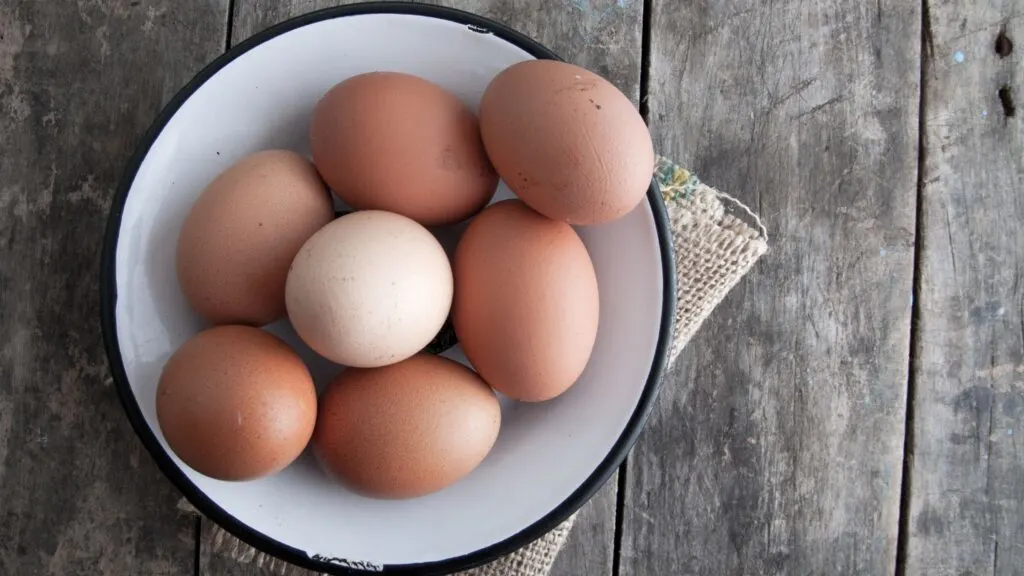
Collect fresh eggs daily and wash them before storing them
If you want your eggs to last, then it’s crucial to collect them daily. When you bring eggs in, check them for any cracks. The egg is okay if the outside shell is cracked, but you can see the thin protective layer, and none of the liquid has come out.
One of the moments you will NEVER forget as a backyard chicken owner is when you stumble upon a rotten egg. The smell is so pungent and unforgettable.
You can bring your eggs in, wash them, and put them in the fridge if you want, but one of the benefits of raising chickens for eggs is having fresh room temperature eggs.
I like to do a lot of baking, and you always want to bake with room-temperature eggs.
You can safely keep your eggs on the counter for two weeks. But if you decide to put them in the fridge, they could last up to three months! Do a little google search on how old the eggs in grocery stores are.

Check your chickens regularly for health problems
When keeping chickens, regular check-ups are critical! By spending a few minutes each week checking your chickens physically and monitoring their behavior, you’ll be able to spot any signs of illness and help them get the treatment they need early on.
The most critical area to check is the vent when you have chicks. If this area gets clogged up, it can lead to death. It’s essential to check the adult chickens as well. Look for combs that are bright red and eyes that are clear.
This is another time it’s essential to keep a chicken planner. You can write down if you start to notice any signs of illness. Also, it helps to look back and see what may have caused the bird’s condition.

Strategies for Staying Organized when Keeping Chickens
Raising chickens is a lot of work. It requires dedication and commitment, but it will be much easier if you’re organized. Here are a few strategies for staying organized when keeping your backyard chickens.
Create a feeding schedule and instructions for all family members to follow. This way, everyone knows when to feed and water the chickens, and no one will forget. This is also helpful when you want to go on vacation.
Create a chart with all relevant information about your flocks, such as breed, age, and sex. This way, you can track which bird is laying how many eggs each day.
Clean out chicken coops regularly to prevent any build-up of mess or smell. Keeping them clean will also reduce the risk of disease and parasites.
Keep a record of any medical treatments you give your chickens, and follow up with regular check-ups to ensure their continued health.
Finally, reward yourself for all your hard work to keep your flock healthy and happy! Treating yourself once in a while will provide you with the motivation to keep going on your chicken-raising journey.
If you aren’t up for creating your charts and systems, I’ve got a solution! Grab my entire Chicken Planner with everything you need!
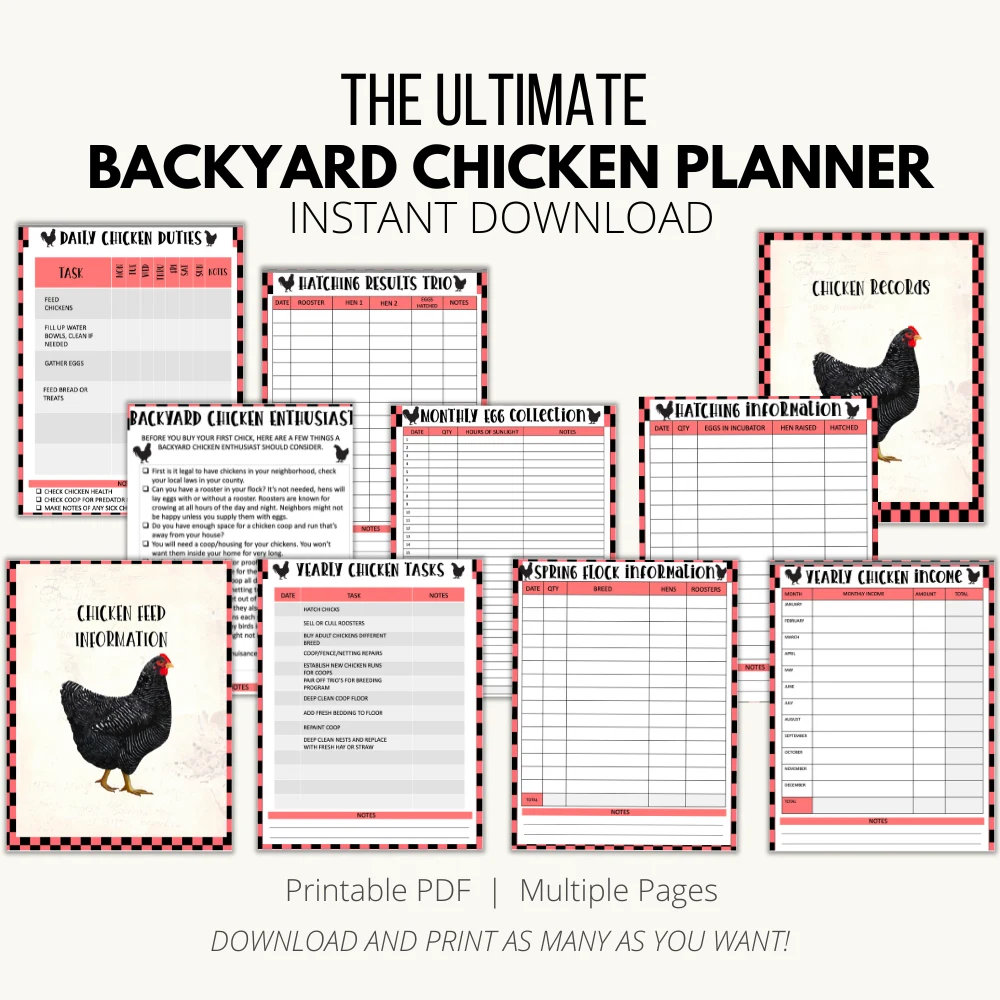
Benefits of Raising Chickens
Let’s take a look at why we love raising chickens in the first place! Aside from providing delicious eggs and tender meat, these feathered friends also give us so much more.
First off, they’re great for fertilizing gardens or composting materials; their manure is an organic source of nitrogen that helps plants grow.
They also provide hours of entertainment – watching them roam around the yard is a calming and enjoyable experience.
And lastly, they are great companions! Once you know your flock, you’ll be amazed at how much character each chicken has. My husband is still surprised that the girls and I can pick out who each hen is when they look identical to him.
Raising chickens is no easy task, but it can be gratifying. It’s a great way to introduce your kids to taking care of a pet and learning more about where their food comes from.
If that doesn’t convince you to check out 15 more reasons why raising chickens is perfect for your children!
3 Disadvantages to Raising Chickens
Although raising chickens has many advantages, it’s essential to understand the potential drawbacks. Chickens require a lot of time and effort to keep them happy and healthy. In addition, daily cleaning and feedings take up quite a bit of your time – be prepared for that!
Secondly, they can attract other animals, such as rats and snakes, eager to taste your chickens’ feed. This is why it’s so essential to maintain a secure coop and keep the area free of debris.
Lastly, chickens make noise, which can be disruptive for some households! Although most breeds aren’t overly loud, you may still hear plenty of clucking and crowing coming from your flock during the day – something that could be a turn-off for some.
If you live in a city or have close neighbors, a Rooster will make his daily morning debut, but the hens can be loud during the day.
When we started with chickens, I still needed to learn this was their usual sound. So many times, I would be working at the computer and quickly run outside expecting to be face-to-face with a predator. But, nope, it’s just the hens fighting over a nesting box.
It’s essential to weigh up all of these points before committing to raising chickens. Then, you can ensure an enjoyable experience for your feathered friends and neighbors!
By following these simple tips, you can be sure that your chickens will be healthy and happy. If you want to learn more about chicken care or help keep your flock organized, grab my Ultimate Chicken Planner.
This handy guide includes everything you need to know about chicken care, from building the perfect coop to feeding your chickens a healthy diet.
With my Ultimate Chicken Planner, you’ll have all the information you need to keep your flock healthy and Happy – so why wait? Get started today!

